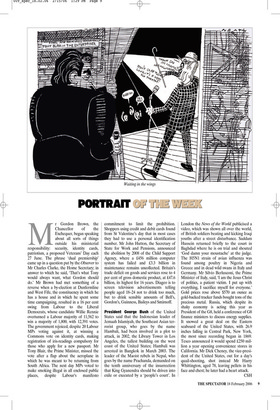PORTRAIT OF THE WEEK M r Gordon Brown, the Chancellor of
the Exchequer, began speaking about all sorts of things outside his ministerial responsibility: security, identity cards, patriotism, a proposed Veterans’ Day each 27 June. The phrase ‘dual premiership’ came up in a question put by the Observer to Mr Charles Clarke, the Home Secretary; in answer to which he said, ‘That’s what Tony would always want, what Gordon should do.’ Mr Brown had met something of a reverse when a by-election at Dunfermline and West Fife, the constituency in which he has a house and in which he spent some time campaigning, resulted in a 16 per cent swing from Labour to the Liberal Democrats, whose candidate Willie Rennie overturned a Labour majority of 11,562 to win a majority of 1,800, with 12,391 votes. The government rejoiced, despite 20 Labour MPs voting against it, at winning a Commons vote on identity cards, making registration of iris-readings compulsory for those who apply for a new passport. Mr Tony Blair, the Prime Minister, missed the vote after a flap about the aeroplane in which he was meant to be returning from South Africa. The next day MPs voted to make smoking illegal in all enclosed public places, despite Labour’s manifesto commitment to limit the prohibition. Shoppers using credit and debit cards found from St Valentine’s day that in most cases they had to use a personal identification number. Mr John Hutton, the Secretary of State for Work and Pensions, announced the abolition by 2008 of the Child Support Agency, where a £456 million computer system has failed and £3.3 billion in maintenance remains uncollected. Britain’s trade deficit on goods and services rose to 4 per cent of gross domestic product, at £47.6 billion, its highest for 16 years. Diageo is to screen television advertisements telling people aged 18–24 not to drink too much, but to drink sensible amounts of Bell’s, Gordon’s, Guinness, Baileys and Smirnoff.
President George Bush of the United States said that the Indonesian leader of Jemaah Islamiyah, the Southeast Asian terrorist group, who goes by the name Hambali, had been involved in a plot to attack, in 2002, the Library Tower in Los Angeles, the tallest building on the west coast of the United States; Hambali was arrested in Bangkok in March 2003. The leader of the Maoist rebels in Nepal, who goes by the name Prachanda, demanded on the tenth anniversary of the insurrection that King Gyanendra should be driven into exile or executed by a ‘people’s court’. In London the News of the World publicised a video, which was shown all over the world, of British soldiers beating and kicking Iraqi youths after a street disturbance. Saddam Hussein returned briefly to the court in Baghdad where he is on trial and shouted ‘God damn your moustache’ at the judge. The H5N1 strain of avian influenza was found among poultry in Nigeria and Greece and in dead wild swans in Italy and Germany. Mr Silvio Berlusconi, the Prime Minister of Italy, said, ‘I am the Jesus Christ of politics, a patient victim. I put up with everything, I sacrifice myself for everyone.’ Gold prices rose above $570 an ounce as gold-backed tracker funds bought tons of the precious metal. Russia, which despite its shaky economy is acting this year as President of the G8, held a conference of G8 finance ministers to discuss energy supplies. It snowed a great deal on the Eastern seaboard of the United States, with 26.9 inches falling in Central Park, New York, the most since recording began in 1869. Tesco announced it would spend £250 million a year opening convenience stores in California. Mr Dick Cheney, the vice-president of the United States, out for a day’s quail-shooting, shot instead Mr Harry Whittington, aged 78, leaving pellets in his face and chest; he later had a heart attack.
CSH


















































































 Previous page
Previous page